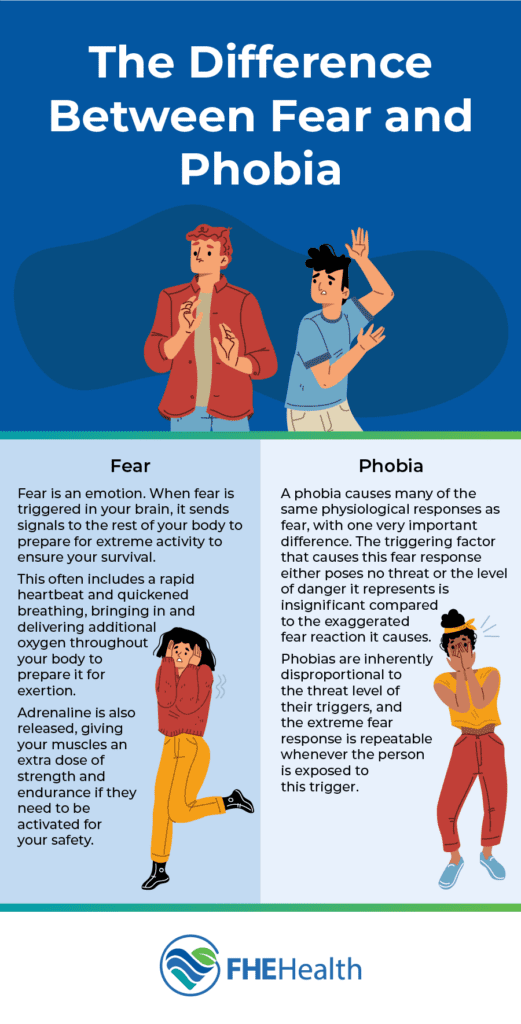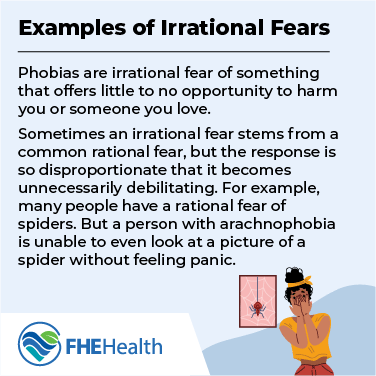
Fear is the response our brains create to react to perceived threats in our environment, whether anticipated or right in front of us. Although uncomfortable, having a fear response is essential to our survival, alerting us to danger and sending signals through our bodies to prepare for what’s to come. This feeling is temporary and can often be worked through once the threat has passed.
A phobia is a fear that defies logic and persistently returns whenever a person is exposed to their triggering factor. Knowing the difference in fear vs. phobia will provide you with the tools to determine whether your feelings are a justified instinct for survival or an unnecessary influence on your everyday life.
The Difference Between Fear and Phobia
 Fear is generally considered an emotion, but it comes with very real physical effects that have a specific purpose: to fight, run or freeze in an effort to respond to a threat. When fear is triggered in your brain, it sends signals to the rest of your body to prepare for extreme activity to ensure your survival. This often includes a rapid heartbeat and quickened breathing, bringing in and delivering additional oxygen throughout your body to prepare it for exertion. Adrenaline is also released, giving your muscles an extra dose of strength and endurance if they need to be activated for your safety.
Fear is generally considered an emotion, but it comes with very real physical effects that have a specific purpose: to fight, run or freeze in an effort to respond to a threat. When fear is triggered in your brain, it sends signals to the rest of your body to prepare for extreme activity to ensure your survival. This often includes a rapid heartbeat and quickened breathing, bringing in and delivering additional oxygen throughout your body to prepare it for exertion. Adrenaline is also released, giving your muscles an extra dose of strength and endurance if they need to be activated for your safety.
A phobia causes many of the same physiological responses, with one very important difference. The triggering factor that causes this fear response either poses no threat or the level of danger it represents is insignificant compared to the exaggerated fear reaction it causes.
Phobias are inherently disproportional to the threat level of their triggers, and the extreme fear response is repeatable whenever the person is exposed to this trigger. The severity of a phobia can vary between people, but it often creates problems in their general lives by forcing changes in behavior or limiting their freedom to engage in anything that might bring them too close to their trigger. It’s estimated that around 12.5% of people will experience a phobia at some point in their lives.
Examples of Rational Fears
 Examples of rational fears include fear responses that happen when your life is in imminent danger. Having a weapon pointed at you or getting swept out to sea without knowing how to swim are situations a reasonable person would consider life-threatening. This also holds true if the threat is directed toward someone or something you love. Fear of your child crossing the street alone is also rational, as there’s a real threat from the vehicles on the road if a driver isn’t paying attention or your little one forgets to look both ways.
Examples of rational fears include fear responses that happen when your life is in imminent danger. Having a weapon pointed at you or getting swept out to sea without knowing how to swim are situations a reasonable person would consider life-threatening. This also holds true if the threat is directed toward someone or something you love. Fear of your child crossing the street alone is also rational, as there’s a real threat from the vehicles on the road if a driver isn’t paying attention or your little one forgets to look both ways.
The common theme is that these situations pose a reasonable threat to do harm. How you choose to deal with these threats also offers some insight. Being afraid of your child getting hit by a car and preventing them from learning the proper way to cross the road in response does very little to actually protect them and could even put them in greater danger by denying them an important life skill.
Examples of Irrational Fears
 The definition of an irrational fear is a fear that is generally directed at something that offers little to no opportunity to harm you or someone you love. These are classified as phobias. Agoraphobia, something that affects 1.7% of the population, is an intense fear of being in public or in a crowded area. People suffering from agoraphobia often won’t leave their homes because the fear is so strong. This severely limits what they can do for themselves.
The definition of an irrational fear is a fear that is generally directed at something that offers little to no opportunity to harm you or someone you love. These are classified as phobias. Agoraphobia, something that affects 1.7% of the population, is an intense fear of being in public or in a crowded area. People suffering from agoraphobia often won’t leave their homes because the fear is so strong. This severely limits what they can do for themselves.
Sometimes, an irrational fear does stem from a common rational fear, but the response is so disproportionate that it becomes unnecessarily debilitating. For example, many people have a healthy fear of spiders and would prefer not to share their personal space with them. This is rational. Conversely, if a person is unable to even look at a picture of a spider without feeling panic, this fear has progressed into arachnophobia, something severely disabling for around 3.5% of adults.
How to Tell If It’s a Fear or Phobia
The easiest way to determine whether your fear meets the criteria to be considered a phobia is to determine the severity of the actual threat. If you can identify a reasonable risk in the situation, the fear is likely justified. If you find yourself struggling to articulate why you feel afraid and the thought of being put in the same or a similar situation fills you with panic, you could be dealing with a phobia. Analyzing your own response to the situation can also provide valuable clues. If your instinct is to remove yourself from a situation that poses no threat to you, your fear may have transitioned into a phobia.
Ways to Cope With Fear vs. Phobia
There are many coping mechanisms that can be used to address logical fears. Breathing and visualization exercises can help calm the physical response that fear creates. Slowing your breathing and heart rate can signal to your brain that the threat has passed, allowing your fear to subside. If it’s situational, removing yourself from the area can lower the response. Taking steps to control the situation better and lower the risk can sometimes alleviate the fear altogether.
Phobias are based in irrational fear, so they can be harder to cope with. While the same exercises can ease some of the discomfort, they’re unlikely to work unless the triggering factor is removed from the situation. People being impacted by severe phobias will have better success if they seek treatment with a licensed professional. Exposure therapy and cognitive behavioral therapy can help bring fear back down to a healthier level that doesn’t cause unnecessary stress.
Find Relief From Irrational Fears With Therapy at FHE Health
If you’re struggling with a phobia and looking for a way to take back control of your life, the licensed mental health professionals at FHE Health have the knowledge and tools to help you. With comprehensive therapy options and separate locations developed to focus on specific areas of mental health, we work to exceed expectations to ensure comfort and establish trust. Give us a call today to find out what we can do to help.






